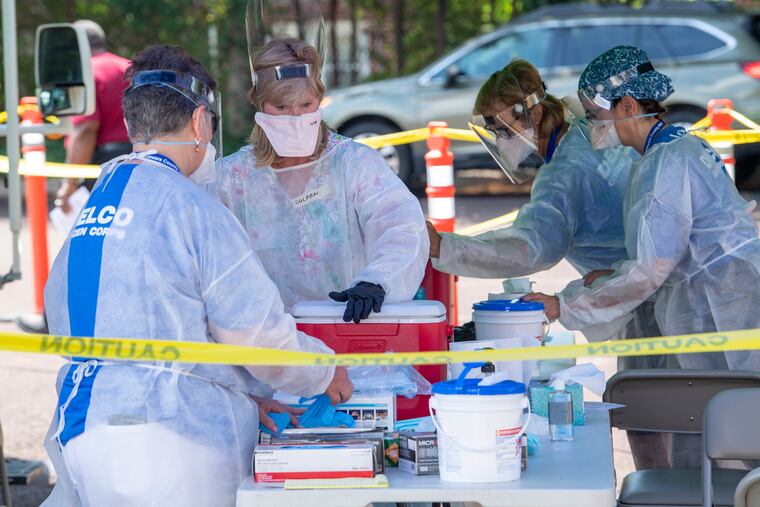Pa. reports its highest daily total of new coronavirus cases since May, but region keeps surge at bay
The Commonwealth is not seeing major outbreaks like Sun Belt states, but averaged more than 730 new cases each day over the last week, nearly double what it was logging three weeks ago. Health officials worry about a dozen Pennsylvania counties where more than 5% of tests were coming back positive.

Pennsylvania reported more new coronavirus cases on Friday than on any other day in the last two months, underscoring a modest but steady climb in the number of infections statewide, as other parts of the country are battling record spikes.
The Commonwealth is not seeing major outbreaks like Sun Belt states, but it averaged more than 730 new cases each day over the last week, nearly double what it was logging three weeks ago. Friday’s tally topped 1,000, of which 834 had been reported within the previous 24 hours.
One hot spot continued to be Allegheny County, while Philadelphia’s infection numbers remained steady. New Jersey, meanwhile, reported encouraging drops in coronavirus transmissions, hospitalizations, and patients on ventilators.
“In comparison to our peer states, we are starting to see some better news,” Gov. Phil Murphy said. But, he tweeted later, reminding residents to distance and wear face masks, that “does not mean that we can become complacent.”
The nation’s most alarming flare-ups remain outside the mid-Atlantic. The virus death toll reached single-day highs in at least eight states this week, including Florida and Oklahoma, and the United States on Thursday reported the highest number of cases in one day yet, setting that record for the sixth time in 10 days, according to data analyzed by the New York Times.
Still, the virus has killed more than 20,000 people in this region since the pandemic began: at least 6,880 in Pennsylvania, 13,532 in New Jersey, and 517 in Delaware.
“Now’s not the time to let up,” Delaware Gov. John Carney tweeted Thursday evening. “We need to protect our progress.”
Among the metrics states have been closely monitoring is the percentage of people whose coronavirus tests come back positive. Gov. Tom Wolf’s office said Friday that health officials were concerned about a dozen Pennsylvania counties where that percentage was trending above 5%; Allegheny County was at nearly 8%.
“By looking at both statewide status and individual county status, we can take steps to stop increases before they become critical,” Wolf said in a statement.
The state had measured Philadelphia’s rate at 5.1%, but did not say for what time period. The city put the rate over the past seven days slightly lower — at 4.7% — but acknowledged likely delays in some data reporting.
An average of 6% of people had tested positive in Delaware over the last two weeks, according to state data updated Thursday. In New Jersey, the statistic was much lower — 2.23% — but the percentage of positive tests in South Jersey was nearly double that statewide.
“Daily positivity and the rate of transmission are the two most meaningful measurements we have of the spread of this virus across our state,” Murphy said during his daily briefing on Friday. “The more testing, the more precise we can get these numbers.”
As New Jersey did earlier in the week, Pennsylvania added Delaware, along with Iowa, Kansas, and Oklahoma, to the list of states under its travel advisory. People entering the Commonwealth from those states are asked to quarantine for two weeks once they arrive here.
Schools continued to grapple with the pandemic fallout and their fall plans.
West Chester University reversed its plans to bring students back to campus for the new school year, announcing Friday it would instead rely on remote instruction for the fall semester.
“With the latest national data showing a disturbing spike and spread in coronavirus infections around the country, we cannot ignore the potential danger of bringing thousands of students back to campus for face-to-face instruction amid the virus’ dramatic resurgence,” President Christopher Fiorentino said in a video message to the university community Friday.
» READ MORE: Colleges’ fall plans: Online classes? Hybrid? Early end to the semester? Options abound.
The 17,000-student state university said it would take steps to help students with online learning, including starting a program to lend laptops, webcams, and mobile hot spots to students without reliable internet access. The library will also mail materials to students’ homes.
When classes resume next month, they will be conducted via Zoom, Skype, email, and other tools, officials said. A few courses will be offered in a hybrid format with some in-person instruction to accommodate clinical placements, student teaching, and similar needs. Some students will be allowed to live on campus, with priority given to people with the most need.
The New Jersey Interscholastic Athletic Association announced on Friday that it planned to offer fall sports in a shortened season, including a six-game regular season plus playoffs for high school football.
» READ MORE: N.J. high school football season to begin Oct. 2, shortened to six games plus playoffs
The Garden State also offered aid to drivers after huge lines plagued the reopening of Motor Vehicle Commission offices this week: The governor extended expiration dates for driver’s licenses, IDs, vehicle restorations, inspections, and temporary tags.
All documents set to expire by May 31 have been extended to Sept. 30, and those set to expire before or on Aug. 31 have been extended to Dec. 13. The extension does not apply to anything that expired before March 13.
Murphy also asked people not to camp overnight or wait in long lines at agencies that have reached capacity; wait to visit or complete the task on the agency’s website if possible.
“We know there is enormous pent-up demand for services,” the governor said Friday. “We’re making more progress on the backlog every day.”
Inquirer staff writer Marc Narducci and graphics editor John Duchneskie contributed to this article.